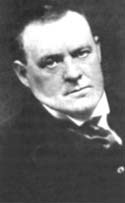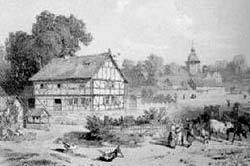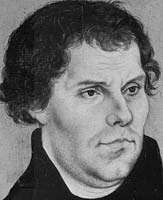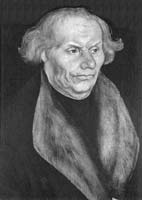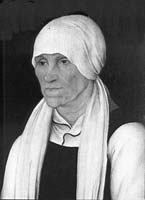|
|
Hilaire Belloc invented an interesting metaphor to explain this sudden success of Luther. “A huge head of water accumulates with a high tide behind a dike. Its level is far above the fields on the landside. But such tides have been known before without any catastrophe following. Men are accustomed to their security; they cannot believe that the barrier will give way. Some wanton mischief or some accident opens a random breach in one small spot out of many miles. Suddenly the waters begin to pour in; the earthwork crumbles, there is a cataract, a flood, and general disaster; a whole land drowned. Such metaphor applies well enough to the sudden cataclysm of the Reformation. The barrier may be compared to the official organization of the Church, long weakened within its intimate structure.”3 This weakening was particularly due to the toleration of clerical lust and avarice, and to the concomitant weakness of Christendom, because Faith had ceased to act as a union. The national spirit was growing stronger and the common good was forgotten. A proof of this is that the Catholic kings of Europe before the Protestant Reformation were too apathetic to mount an united crusade against the advancing Muslims, although a series of popes called on them to do so, repeatedly, for over 50 years. The papacy had lost much of its influence; it was degraded into a sort of Italian dynasty, with successive popes drawn from the great Italian families and nepotism taken for granted. The wealthy laity was affected by avarice, and, at the same time, civil government was more powerful than before, and consequently more expensive. There must have been a strong temptation to confiscate all ecclesiastical endowments and disband the monasteries, and to treat the Church as a mere international corporation with headquarters far away in Rome. Catholics, who should have loved the Church as a mother, were lax in their piety. Churchmen, who should have been full of fatherly concern for their spiritual children, were preoccupied with worldly concerns. To return to the analogy, the pressure upon the dike was overwhelming. It required very little pressure to cause a leak. “When the first breach did come, it came but in one not very important town, by the action of one not very well-known man, who acted with no intention of producing the effect he did. A trickle at the most was first observed; it became, in rapidly successive leaps, a stream, a torrent, a flood. Yards, then miles, of the earth wall crumbled away in the swirl of waters, and the sea poured in.”4
Early LifeMartin Luther was born in a German town called Eisleben, in 1483. He died in the same town 63 years later, in 1546. Between those dates he did not lead a small-town, peaceful life. He came from a strict home and had a strict early education, where the rod was frequently applied. Recalling a school-day experience, Luther related that he was once beaten fifteen times in succession, and, “to the best of his knowledge, without much fault of his own.”5 Too much could be made of this. Considering Luther’s stubbornness, perhaps this only increased his obstinacy. His family did push him to succeed in school, and when his father was in a better financial position he paid well for young Martin’s education. The original goal was that Martin Luther should become a lawyer. This was an avenue of social advancement open to him. At the age of 21, after having obtained a Master’s degree in Arts, Martin Luther began the serious study of jurisprudence, but after a few weeks he abandoned these studies and returned home. To the disappointment of his father, Martin resolved to become a monk. There are several stories of how this vocation arose, and they seem to indicate a sincere resolve by Martin Luther to lead a better life. Each of the stories is an encounter with death, which is well suited to impress on a young man that the only important thing is to live so as to die well. The last impetus came on July 2, 1505, while Luther was walking outside in a thunderstorm. The lightening flashed very close to him and he called out to St. Anne for protection: “If you come to my aid, I will become a monk.”6 This was perhaps a rash vow, forced from him by terror of the thunderstorm, but it was a vow to lead a better life. Perhaps Martin Luther had considered this course of life already. Both his parents and his friends opposed this course, feeling that it was the expression of a temporary attitude of mind, rather than a real vocation. But, fifteen days later, Martin Luther set off for the Augustinian monastery at Erfurt. The prior received the young Master of Arts graciously, and permitted him to enter. According to the rule of the Augustinian Order, the postulant was now given time to learn what lay before him as a friar, before donning the novice’s garb. An experienced member of the Order would instruct him in the rule and repeatedly urge him to judge well whether “the spirit which was leading him was of God.” Only after these few months of preparation was he given the white habit of a novice.7 The novitiate lasted the usual year, at the end of which Martin Luther made his vows of poverty, chastity and obedience, and received the black habit of the Hermits of St. Augustine. From this moment he was a monk who had vowed himself to live according to the evangelical counsels of perfection. The young monk was directed to study theology, and after the surprisingly brief time of one year, Martin Luther was raised to the priesthood!
His superiors sent Fr. Martin Luther to Wittenberg, to be a teacher of philosophy and dialectics. He gave himself with great ardour to the study of the Bible, but somewhat neglected the rest of his theological education. In 1509 he obtained a degree on Holy Scriptures, an important step towards a doctorate. Father Luther had little respect for St. Thomas Aquinas or the whole system of Aristotelian logic; he had been brought up with the teachings of Ockhamist Nominalism.11 It was a teaching of Ockhamist Nominalism that a man can overcome sin by will alone, and that no human action is meritorious unless God acknowledges it and wills it to be so. Grace was not conceived of as a supernatural principle really justifying a man. For the Nominalist, God is capricious, granting or withholding His forgiveness for reasons man is incapable of understanding. In certain respects, Martin Luther remained an Ockhamist all his life; “but he rejected the voluntarism taught by Ockham’s disciples, he denied the human liberty which they recognized, and he gave it a ring of predestinationism which was absent from the master’s philosophy. None of this did anything to grant him (Luther) peace of mind.”12 Standards were not as high in those days as they were to become after the Council of Trent, that ended in 1563, imposed ordered seminary training on all priestly candidates. During the winter of 1510 – 11, Luther walked to Rome and stayed for four weeks. He had been chosen by his superiors to submit a dispute to the Major Superiors of the Augustinians. Legend has made this trip the turning point of Martin Luther’s life, as if, seeing the corruption of the Pope’s court, Luther then resolved to undertake the reform of the Church. The truth is that Luther behaved like any pious pilgrim, visiting churches and gaining indulgences, and he undoubtedly heard a good deal of gossip. It did not affect Luther immediately, but years later, after his condemnation by the Pope, Luther revived these memories to justify his own attitude.
|
|||||||||||||||||||||||||||||||||||||||||||||||
 |
|
Martin Luther, Augustinian Monk |
|
The heresy of Protestantism is based on a false doctrine of justification, called justification by faith alone. We will study how Luther came up with this heresy later. First, we need to define the terms and clarify the Catholic doctrine. Justification, considered as an act, is the work of God transforming a sinner from a state of sin to a state of justice. The continued possession of this justification is called the state of sanctifying grace or righteousness. When a sinner is justified, he is cleansed from all mortal sins, and the eternal punishment of Hell is remitted to him. The Council of Trent is very clear in stating that when we are justified, “not only are we reputed but we are truly called and are just.”13“Moreover, it must not be maintained, that they who are truly justified must need, without any doubt whatever, convince themselves that they are justified, and that no one is absolved from sins and justified except he that believes with certainty that he is absolved and justified, and that absolution and justification are effected by this faith alone, as if he who does not believe this, doubts the promises of God and the efficacy of the death and resurrection of Christ. For as no pious person ought to doubt the mercy of God, the merit of Christ and the virtue and efficacy of the sacraments, so each one, when he considers himself and his own weakness and indisposition, may have fear and apprehension concerning his own grace, since no one can know with the certainty of faith, which cannot be subject to error, that he has obtained the grace of God.”14 These two quotations from Trent contradict two of the most important aspects of the Protestant heresy on justification. It is unfortunate that Martin Luther did not have the advantage of these clear definitions when he was first tempted to heresy.
The state of Father Martin Luther’s own soul during his years in the monastery is important in explaining the origin of his heresy. Martin Luther’s own testimony, given in later years, is dismissed by a number of critics as legend; he tried to invent a reasonable explanation for his actions. There is no real reason to believe that Luther entered the monastic life with dishonest intentions, or that he did not live as a good monk, at least in the beginning. He cut himself off from the world, seeking peace for his soul, and found it at the monastery. Thorough research brought Professor Denifle to conclude Luther had been, for the first 8 or 10 years, a regular, peaceful and happy monk.15 The problems really started when Luther was repeatedly promoted: Sub-prior of his monastery (1512); Doctor of theology and Lecturer on the Bible (1513); District Vicar of his Order for Saxony and Thuringia (1515). He needed two secretaries, was always writing letters, had to manage the finances of a monastery of forty-one monks, was teaching and preaching, and had a score of other duties. He therefore abandoned little by little his spiritual life. As a result, his passions grew stronger, and temptations plagued him. He then developed an unhealthy habit of scrupulosity, and started to fear having committed grave sins in any of his actions. He then tried to find answers in studying theology, and since he was so busy, he would find time by omitting for weeks on end to pray his breviary (which omission was truly a grave sin). He simultaneously tried to overcome these trials by his own strength, following his own methods, and became imprudent in his asceticism and penances. Concerning that period, he would write of himself: “I was a pious monk, and so strictly followed the Rule of my Order, that I dare say if ever any man could have been saved by monkery, I was that monk. I was a monk in earnest…. If it had continued much longer, I should have carried my mortifications even to death, by means of watchings, prayers, readings, and other labours.”16Reading these words of Luther we can see a contradiction: the Rule of his Order does not include mortifications dangerous to a monk’s life. If Martin Luther was in danger of death, it was because of some personal excesses in penance that he practiced in an ill regulated manner. This is what Martin Luther tells us of his penances: “I prescribed special tasks for myself and had my own ways. My superiors fought against this singularity and they did so rightly. I was an infamous persecutor and murderer of my own life, because I fasted, prayed, watched, and tried myself beyond my powers, which was nothing but suicide.”17 Such private penances are forbidden to those vowed to obedience, in order to prevent excesses and to force pious souls to practice humility, for there is a danger of pride in doing one’s own will, even in choosing one’s penances. Non-Catholics accuse the Church of driving Luther to these extravagant ascetic practices. It is not true. Luther had a distorted idea, all his own, when he said: “I am a most presumptuous justifier, who trust not in God’s justice, but in my own.”18 Fr. Martin Luther’s penances were an attempt to assuage the just wrath of an angry God. This attempt failed to free Luther from temptation and probably from occasional sins. “When I was a monk,” Luther later wrote, “I used immediately to believe that it was all over with my salvation every time I experienced the concupiscence of the flesh…. I used to try various remedies; I used to go to confession every day, but that didn’t help me at all. For this concupiscence of the flesh was always returning, so that I could never find peace, but was everlastingly tormented with the thought, ‘You have committed such and such a sin; …and all your good works are just useless.”19 On one occasion Martin Luther spent six hours confessing his sins. Wearied with this, his confessor exclaimed: “God is not angry with you. You are angry with God. Don’t you know that God commands you to hope?”20 Unfortunately, like other victims of scrupulosity, Luther was not content to follow the wise counsel of his confessor. Unable or unwilling to elicit childlike confidence in the pardon and mercy of God, Luther sought for justification by his own penances and mortifications.
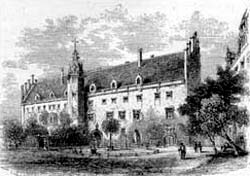 |
|
Augustinian Monastery at
Wittenberg |
A pronounced
scrupulosity complex, aggravated by an inclination to melancholy,
thus thwarted the wholesome development of Luther’s religious
life. “It is perfectly clear to anyone reading many of his
own confessions that Luther was …burdened with a tragic sense
of sin in all its intensity. But of what sin? …Only God, who has
already judged the soul of Martin Luther, can supply an answer.”21
The burden of sin was too much for Luther or any other man to
bear. Then something cracked. Defeated, Fr. Luther concluded that
all human acts, no matter how good they may seem, are in reality
mortal sins. And this would be the result of Original Sin, which
would always corrupts the free will and make men incapable of
anything truly good. With this gloomy conviction settling upon
him, the questions of redemption and Justification became more
and more important. “While studying the Epistle to the Romans
in the winter months of 1512–13, he thought that he found the
answer. It was in the seventeenth verse of the first chapter where
St. Paul declares, “The just man liveth by faith.” Here was the
key that would solve all his inner distress and all his torturing
questions. That key was: justification through God by faith. That
single phrase became for Luther, as he remarks, “the door to paradise.
This became the foundation for his new theory of salvation, the
cornerstone of the new religion he was to establish. Man can be
saved by faith alone. Justification is conferred upon man by God’s
grace. Unable to do anything to co-operate, man can merely submit
in trustful faith to the hand of God…. It is faith in Christ that
makes His merits our own, envelopes us in the garb of righteousness
and makes up for every defect. ‘Be a sinner and sin on bravely,’
declared Luther, ‘but have stronger faith and rejoice in Christ,
who is the victor of sin, death and the world. Do not for a moment
imagine that this life is the abiding place of justice: sin must
be committed. To you it ought to be sufficient that you acknowledge
the Lamb that takes away the sins of the world; the sin cannot
tear you away from Him, even though you commit adultery a hundred
times a day and commit as many murders.’”22
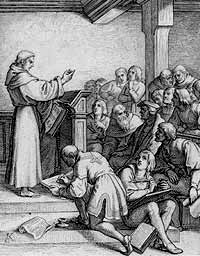 |
|
|
Luther Lectures at Wittenberg |
|
With newfound confidence, Martin Luther did not keep his heresy to himself. About 100 years ago, copies of Luther’s lectures during the years 1513–17 were rediscovered. These lectures give proof that even before he publicly challenged the system of indulgences, Martin Luther was formulating the dogmas of a new religion. “In his lectures on this epistle (to the Romans) …Luther teaches that the righteousness, by reason of which the one-time sinner is now accepted by God as reconciled, is no more than a righteousness cast around him by God, imputed to him, behind which, or apart from which, the sinner himself remains exactly as he was before the divine acceptance justified him; and that what brings about justification is faith, and faith alone, by which term is meant the sinner’s confidence in God’s word announcing the promise and the fact of salvation. No ‘good works’ done by man can at all avail towards his salvation. Man himself is never anything but sin, for even after baptism there remains in him that tendency to do evil, which is itself sin and so vitiates every action done by man. All man’s acts are sins, then; and continue to be sins, even after justification; but, in the case of the justified, God does not hold this sinfulness against them. As to those acts by which man deliberately sins, these also, even though forgiven, are not destroyed.”23
Father Martin Luther and his pupils challenged the theological system of scholastic philosophy then taught at the little university of Wittenberg. They compared the old teachings to the “religion of law” and presented Luther’s new ideas as the “religion of grace.” If these disputes had continued at the level of the university, Luther would eventually have been condemned. But before this occurred, something unexpected happened: Luther made a bold public statement by challenging the Dominican monk, John Tetzel, about the preaching of the indulgence.
The Indulgences
It is best to begin this next question – on indulgences – with a definition of the Church’s teaching. Perhaps no doctrine of the Church is more misunderstood than that of indulgences. For the sake of proper apologetics, we will examine what an indulgence is (against the doctrine of ignorance), the doctrine on which indulgences are based (against the objection of heresy), and some abuses.
Against ignorance, let everyone understand that an indulgence is not a sacrament. Sacraments really confer, give back, or increase sanctifying grace in a soul. Baptism washes away Original Sin, and also personal ones, if any. Penance erases personal sins, i.e. those committed after Baptism. Indulgences do neither of these; they only remit, totally or partially, the temporal punishment due after a sin is forgiven. Eternal punishment, or Hell, has been remitted after the Sacrament of Penance was received. But a certain debt towards God remains. To satisfy God’s Justice, we must therefore expiate our past sins. It can be done after our death, in Purgatory’s terrible fire, or during our life by voluntary penance. An indulgence is like an extra penance which we take on in reparation for our sins, except that it is not valued as our own action, it is given a greater value from the treasury of the satisfaction of Christ and the saints.
An indulgence does provide a real payment to God in reparation for our sins. Depending of the conditions, the indulgence will be partial or total, and we can apply it for the payment of our own debt, or for that of the faithful departed who suffer in Purgatory. The conditions for gaining an indulgence are: 1)To receive the sacraments of Penance and Eucharist; 2) That our will be totally detached from sin, even venial; 3) To perform some good work, as determined by the able ecclesiastic authority (v.g. to visit a church, to do some special prayers, to give alms, etc.). So it is not a legal fiction whereby a debt is pardoned, without being paid. Nor is an indulgence in no way a permission to sin. The merits of Christ and the saints are real, and they are not lost; they are saved in a spiritual “treasury”. Those with authority in the Church, the Pope or a bishop, can draw on the treasury of these merits, under certain conditions, to pay a certain amount of the debts that repentant sinners owe to God. The merits contained in this spiritual treasure are infinite and inexhaustible. This beautiful doctrine is truly consoling and helpful to our souls.
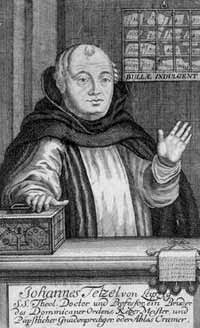 |
|
|
Father John Tetzel O.P. (1460-1519) |
|
Against heresy, we may present evidence that indulgences are a supernatural reality. The doctrine of indulgences is based on the possibility of application to one person of the satisfaction performed by others. This transfer is based on three other Catholic doctrines: 1) The communion of the saints – “We being many, are one body in Christ, and everyone members one of another.” -Rom. 12:5. Thus, each faithful Catholic profits by the prayers and good works of the rest. 2) The principle of vicarious satisfaction. This means that the merit of each good action is personal, but the satisfaction can be applied to others, as St. Paul wrote of his own works: “I rejoice in my sufferings for you, and fill up those things that are wanting of the sufferings of Christ in my flesh, for His Body, which is the Church.” -Col. 1:24. 3) The “treasury” of the Church, as the “reserve fund” of satisfaction is commonly called. Christ offered more than enough satisfaction for all the sins of mankind. The debt of the sins of all men is less than the infinite value of the sufferings of Christ in His passion, and to this is added the satisfactory works of the saints. The root of this teaching is also found in the above quoted passage from the Epistle to the Colossians. It was clearly expressed as a dogma by Pope Clement VI in his bull “Unigenitus” in 1343. Luther should have known this since he was a professor and doctor of theology. If he was ignorant, he could easily have researched the point in the theological manuals of the day. But, for Luther, indulgences were only a secondary point to be denied after accepting justification by faith alone, and it was its logical consequence: Since good works do not justify us, Luther reasoned, there can be no value in an indulgence attached to a good work.
The circumstances surrounding the “quarrel of indulgences”. Indulgences were a stumbling block to Protestants because of the abuses. That question was one of those who brought the most disciples to Luther. The Catholic Church, however, maintains the doctrine of indulgences while condemning their misuse. And she did it even before Luther, but in isolated cases. Let us talk about the historical context of this “quarrel”. In the late Middle Ages, the giving of alms to a worthy cause was often prescribed as the supplementary good work necessary for gaining an indulgence. Money is the root of all evil, for wherever money is an important concern, greed enters in the heart of man. But clerics are men too. The vice of greed led to over-emphasising on almsgiving during the pre-Reformation period. There were preachers of indulgences that acted as traffickers, and had little concern to elicit in the faithful the necessary interior conditions of sorrow and amendment of life; they were engrossed only in collecting as much money as they could. Honest men made public protest and condemned the abuses. Thus, in 1513 Cardinal Ximenes forbade the preaching of the indulgence for alms in Spain, and, around the same time, Duke George of Saxony prohibited them in his own territory, which included the town of Wittenberg.
At the beginning of the 16th century, there was a popular dissatisfaction with the preaching of indulgences. It was not, in general, a rejection of the doctrine, but an opposition to the mercantile method with which the indulgences were sometimes preached. The indulgence of 1517 was granted by Pope Leo X for the collection of alms money, to raise funds for the construction of St. Peter’s Basilica in Rome. Behind the scenes, money was changing hands in an inappropriate manner. Bishop Albert of Brandenburg was heavily involved in debt, “to pay a bribe to an unknown agent in Rome, to buy off a rival, in order that the archbishop might enjoy a plurality of ecclesiastical offices. For this payment, which smacked of simony, …the pope would allow an indemnity, which in this case took the form of an indulgence. By this ignoble business arrangement with Rome, a financial transaction unworthy of both pope and archbishop, the revenue should be partitioned in equal halves to each, besides a bonus of 10 000 gold ducats, which should fall to the share of Rome.”24 Yes, this financial arrangement was unworthy and probably sinful. But we must understand that this agreement between the Pope and the Archbishop was at the time a secret, at least in its details. Neither Father Martin Luther, nor the common people knew about them. Probably they sensed, though, that something was wrong in the preaching of indulgences to gather funds.
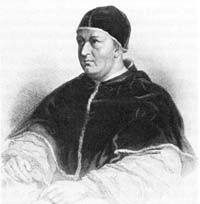 |
|
|
Pope Leo X (1475-1521) |
The preacher of the 1517 indulgence, who came to the region near Wittenberg, was a Dominican monk of sound doctrine – John Tetzel. He was much maligned even by his contemporaries, who placed blasphemous words in his mouth, but true history has rehabilitated him as a doctrinally sound and morally upright monk, and an orthodox preacher. Since the indulgences were not to be preached about in Saxony, many people from Wittenberg went to the nearby towns of Juterbog and Zerbst to hear Tetzel preach. Some of these people then came to Luther and showed him the letters of indulgence they had received. It was then he decided to act. On the day before the patronal feast of All Saints Church in Wittenberg, Saturday, October 31, 1517, Martin Luther nailed a list of 95 Latin theses to the door of the church. Among these theses is this objection (#86) “Why does not the pope, whose wealth is today greater than the wealth of the richest Crassus, build this one basilica of St. Peter with his own money rather than with the money of poor believers?” Despite this question’s demagogy – because how could Luther have known the amount of money the Pope had, and how could an individual finance such a grand building? – we understand there might have been some uneasiness with the way this 1517 indulgence was sometimes preached. But let’s say it again: we must be aware that Luther’s rejection of the indulgences was only a logical step for him, after his having rejected the traditional doctrine on Justification.
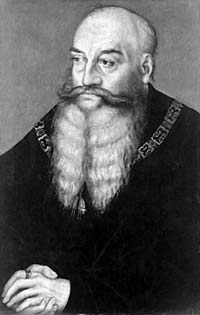 |
|
|
Duke George of Saxony (1471-1539) |
All Saints Church was part of Wittenberg University. If we except the content of his thesis, we must know that his action was not unusual, as the door served as a bulletin board of the university. “The act was not an open declaration of war, but simply an academic challenge to a disputation. ‘Such disputations were regarded in the universities of the Middle Ages partly as a recognized means of defining and elucidating truth, partly as a kind of mental gymnastics apt to train and quicken the faculties of the disputants. It was not understood that a man was always ready to adopt in sober earnest propositions which he was willing to defend in the academic arena; and in like manner a rising disputant might attack orthodox positions without endangering his reputation for orthodoxy.’”25 Martin Luther, however, was a heretic in sober earnest, but it took some time for the authorities in the Church to realize that. Father John Tetzel was told about Luther’s action. He took a copy of the 95 thesis, studied them, and recognized them as being heretic. He accepted the Augustinian’s challenge and, in 1518, sent him his answers.26 But instead of debating with Tetzel in the academic forum, Luther carried his novel teachings to the public arena by issuing in the vernacular his “Sermon on Indulgences and Grace.” This was wrong, for it was not an appeal to a competent tribunal where the case would be decided on its theological merits; it was an appeal to the crowd, where newly kindled sentiments of nationalism would win the verdict.
References:
1. Karl Adam, The Roots of the Reformation, P. 15, Sheed and Ward, New York, 1951.
2. Karl Adam, The Roots of the Reformation, P. 16, Sheed and Ward, New York, 1951.
3. Hilaire Belloc, How the Reformation Happened, P. 33-4, TAN, Rockford, Illinois, republished 1992.
4. Hilaire Belloc, How the Reformation Happened, P. 37, TAN, Rockford, Illinois, republished 1992.
5. Msgr. Patrick O’Hare, The Facts about Luther, P. 28, TAN, Rockford, Illinois, revised ed., republished 1987.
6. Henri Daniel-Rops, The Protestant Reformation, V. 2, P. 16, Image Books, New York, 1963.
7. Msgr. Patrick O’Hare, The Facts about Luther, P. 39, TAN, Rockford, Illinois, revised ed., republished 1987.
8. Msgr. Patrick O’Hare, The Facts about Luther, P. 42, TAN, Rockford, Illinois, revised ed., republished 1987.
9. Msgr. Patrick O’Hare, The Facts about Luther, P. 43, TAN, Rockford, Illinois, revised ed., republished 1987.
10. Msgr. Patrick O’Hare, The Facts about Luther, P. 44, TAN, Rockford, Illinois, revised ed., republished 1987.
11. William of “Ockham was a Franciscan scholar, at both Paris and Oxford. He died in 1349, but his powerful personality dominated the world of philosophy for a hundred and fifty years. An intellectual trend that goes back to Abelard …reaches its culmination in Ockham. This was the via moderna, henceforth to be known as Ockhamism, or even as Nominalism or Terminism, because it maintained that general ideas have no reality, being merely words, names or terms. The only reality consists in what can be grasped by experience, i.e. individual beings. ...Ockham categorically refused to concede reason the power to prove and grasp God. However, in thus proclaiming himself a Christian, he found a palliative to his agnosticism in a radical and supernatural theology, in which faith was all-sufficient. It was by faith and faith alone that man could understand the great truths of God’s existence and attributes, of the spirituality and immortality of the soul. But this act of faith, this total submission to the will of God, had no connection with the processes of the mind enlightened by reason. - Henri Daniel-Rops, The Protestant Reformation, V. 1, P. 210-211, Image Books, New York, 1963.
12. Henri Daniel-Rops, The Protestant Reformation, V. 2, P. 22, Image Books, New York, 1963.
13. Decrees of the Council of Trent, Sess. 6, Chap. 7.
14. Decrees of the Council of Trent, Sess. 6, Chap. 9.
15. Catholic Encyclopedia, Tome IX, p.440.
16. Msgr. Patrick O’Hare, The Facts about Luther, P. 50, TAN, Rockford, Illinois, revised ed., republished 1987.
17. Msgr. Patrick O’Hare, The Facts about Luther, P. 51-52, TAN, Rockford, Illinois, revised ed., republished 1987.
18. Msgr. Patrick O’Hare, The Facts about Luther, P. 52, TAN, Rockford, Illinois, revised ed., republished 1987.
19. Philip Hughes, A Popular History of the Reformation, revised ed., P. 95, Image Books, New York, 1960.
20. John A. O’Brien, Martin Luther, The Priest who Founded Protestantism, P. 8-9, The Paulist Press, New York, 1953.
21. Henri Daniel-Rops, The Protestant Reformation, V. 2, P. 20, Image Books, New York, 1963.
22. John A. O’Brien, Martin Luther, The Priest who Founded Protestantism, P. 9-10, The Paulist Press, New York, 1953. The inner quotation from Luther about sinning bravely is taken from Enders, Briefwechsel, III, 208.
23. Philip Hughes, A Popular History of the Reformation, revised ed., P. 96, Image Books, New York, 1960.
24. H.G. Ganss., The Catholic Encyclopedia, Vol. 9, Luther, P. 441-2, Robert Appleton Co., New York, 1910.
25. H.G. Ganss., The Catholic Encyclopedia, Vol. 9, Luther, P. 442, Robert Appleton Co., New York, 1910.
26. Father John Tetzel, O.P., then retired in his monastery, where he died on August 11, 1519.


